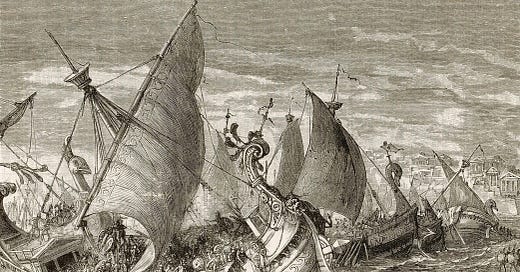Does anyone else love reading the first three pages of a book and then writing about it like they’ve read the whole thing?
My subject of interest today is Thucydides’ History of the Peloponnesian War. It’s dense, and admittedly, I don’t have enough background knowledge in the history of Greece to really make sense of it, so it might end up in the Abandoned Book Pile (aka the coffee table). For now, though, I’m pretty excited to read it.
Last night, I read the first few pages P.J. Rhodes’ introduction to the Oxford World Classics edition, and found some interesting stuff. So far, the introduction offers a clear, entry-level description of what was going on in Greece at the time, so I’d recommend it to fellow novices.
For convenience, I’ll distill what I’ve learned in list form:
The Peloponnesian War was fought between Athens and Sparta. Athens was growing as a power, threatening Sparta’s supremacy in Greece.
There is a concept called ‘Thucydides’ Trap,’ coined by the political scientist Graham T. Allison, which describes the tendency for war when a new power comes to the scene and threatens the authority of an established power.
Before the Peloponnesian War, Greece was involved in another war with Persia. Persia wanted to conquer all of Greece, which neither Athens nor Sparta would have enjoyed, so the rival city-states briefly got along.
Their defense was successful, and the Persians were defeated, never to invade again. However, the possibility of a threat remained (and Athens had the urge to retaliate). Thus, Athens created an alliance with some lesser powers in Greece called the Delian League, who joined their powers against Persia.
At this point, in the absence of an imminent foreign threat, Athens and Sparta were rivals again.
As the head of this alliance, Athens started to take advantage. They started taking money from their allies, growing their own power considerably as a result.
I don’t know what happens next. I was too tired to keep reading. However, this left me with a few questions:
Athens is heralded as the ‘birthplace of democracy.’ Was it ever the beautiful, free haven that I was taught about in school?
If so, how long did it stay that way before it got corrupted?
What caused it to change?
Could there be a parallel between this and the trajectory of American ‘democracy.’
Apparently, Thucydides addresses questions such as the nature of power in History of the Peloponnesian War (and it’s supposed to get rather dense by then; hopefully I can keep up).
If you don’t ever receive the answers to these questions, assume I gave up on the book. Otherwise, stay tuned.
Edit: Looks like I didn’t get this totally right. For clarification, read this (and check the comments for further updates):
If anyone else has anything to correct/add, I appreciate all feedback. As always, the point of this is to learn as much as possible.
Thank you for reading. If you enjoyed this post and would like to support my work, consider becoming a free or paid subscriber.






So not quite right; it was less that Sparta and Athens were rivals than they were the two "great powers" of Hellas (to use the Greek's own term). The creation of an essentially imperial Athenian Empire through the Delian League and coercion led the weaker polises of Hellas to appeal to Sparta for help against Athens. Athens was very definitely not the "good guys" in this story; rather they were essentially bullies in their foreign policy using the maintenance of a fleet (a very costly endeavor) to prevent a repeat of Persian aggression as an excuse to expand their influence.
It's a great read; I've tried to read it in the original Attic but my Greek isn't that good (I can barely deal with Xenophon). Speaking of Xenophon, his "History of My Times" picks up where Thucydides leaves off.
If you need any comic relief my favorite writer composed comedies at this time, Aristophanes (translated by Paul Roche,brilliant!) It definitely has parallels to America, with a moron at the helm driving the country into wars and defeat, a once great power. Aristophanes, wrote a play where the women from both sides withheld sex until their idiot husbands saw sense!